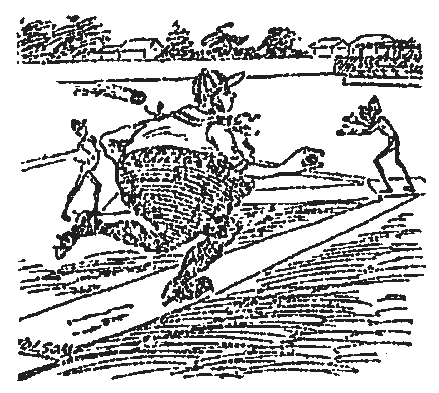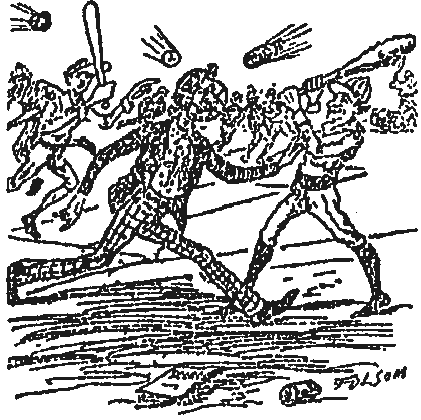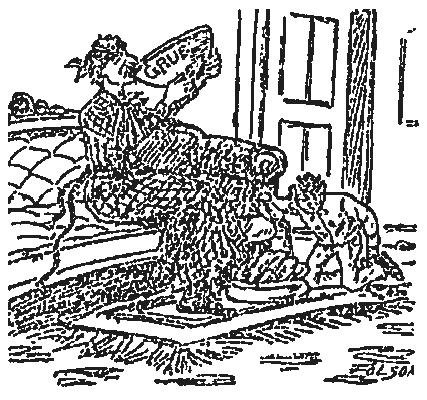Quotations | Newspaper Articles | Special Features | Links | Search
SPECIAL FEATURE
by
Barbara Schmidt
Henry Guy Carleton was a noted humorist, journalist and playwright of the nineteenth century. After attending a baseball game in Elmira, New York in July 1887, he wrote the following tongue-in-cheek report of the event which appeared in the Boston Daily Globe and other newspapers across the country.
_____
MARK TWAIN AS UMPIRE
by Henry Guy Carleton
Boston Daily Globe, July 3, 1887, p. 1
TWAIN AS UMPIRE
By Henry Guy Carleton
The Humorist Presides at a Game of Base Ball,
And Lays Down Some Original and Startling Rules.
The Coroner Summoned, But Mark Revived.
Rev. Mr. Beecher Acts as an Associate Umpire.
An Event at Elmira Which Marks An Epoch in Base-Balling.
ELMIRA, July 2. - I left New York last evening to attend the base ball match here between the Alerts and the Unions, Governor Hill being unable to come, and journeyed by way of the Delaware & Lackawanna.
I occupied upper "3" in the third alleged sleeper, in company with four flies, who had neither tickets nor a pass.
I ascertained from the porter, during a somewhat heated conversation about 11 o'clock, that ice-water and flies are allowed to every traveler going west without extra charge.
I took my ice-water about 11:30 and then turned in to enjoy my flies.
The railroad fly is an innovation which will be appreciated by tourists during the heated term, and I was thankful I had four. "Lower 6," across the way, who had a lunch basket and some beer under his berth, made several remarks during the silent watches of the night, which led me to believe he had several times that number. The flies assigned to me slipped over now and then to take a light back at the pie and a sip of the beer, but just as I had settled into a doze they would come frolicking back to skate on my forehead, toboggan down my nose and tunnel under the sheet to study anatomy, so that it was daylight before I ceased to be amused and fell asleep.
At 7 o'clock the porter aroused me and remarked, in a low, confidential key, that he had somehow got me mixed up with another man who was going to Bath, farther up the road, and shunted him off by mistake for me at Elmira which we left at 6:44. He added that if I would hurry and dress he would ask the conductor to stop the train at Corning, where, in a couple of hours, I might get a train back to Elmira; and he would be obliged, if I met Bath there, to explain how the little affair occurred and tell him he could continue his journey on the afternoon limited.
Iced Porter.
I expressed my thanks to that porter, and after seeing his remains packed in ice so that he wouldn't spoil before reaching his family, I got off at Corning, and after corning up for two hours got on an Erie hearse bound for Elmira and arrived just before noon. To while away an hour or two before the game I drove out to the State reformatory to see Mark Twain, alias S. L. Clemens, who is serving a summer term for a misunderstanding with the authorities over the ownership of a mule. According to his story he found a lariat on the outskirts, and was pained on arriving home to find that mule tangled with the other end.
I was courteously received by the superintendent, who informed me he could easily fix things so I could remain six months or so without charge. He said that Twain had been loose for several days, but the police were in possession of valuable clews and would be able to lay their hands on him in the course of the day. He pressed me to remain and enjoy a cool, dark cell but I thanked him and left.
The match game for the championship of Elmira occurred this afternoon on the race track. The Unions and Alerts were rival clubs 25 years ago, but were disbanded by the sheriff in 1866 and most of the members have just got out.
Personnel.
The Unions are composed of Mayor Stanchfield, p.; John Potter, c.; J. D. Burt, 1b.; W. L. Hylen, 2b.; L. M. Millspaugh, 3b.; D. C. Robinson, s.s.; C. E. Kapeleyea, l.f.; S. I. Seeley, c.f.; Burr Hendricks, r.f.
Mr. Stanchfield is Mayor of the city. Mr. Robinson is attorney for the Erie road and the Mutual Life. Mr. Kapeleyea is the largest and most desperate lumber merchant in the county, and the others are equally notorioius.
The Alerts are J. S. Denton, p.; John Bennet, c.; William Easterbrook, 1b.; Frank M. Blossom, 2b.; John Bailey, 3b.; Chauncey M. Beadle, s.s.; Charles Hart, l.f.; Seymour Dexter, c.f.; John A. Reynolds, r.f..
Easterbrook is president of the telephone company; F. M. Blossom is teller of the Chemung Bank, and bald as a hard-boiled egg; Beadle is manager of J. Langdon & Co., limited; Hart is receiving teller of the Chemung Bank; J. S. Denton is superintendent of the mails and females; Bennett's cashier of the Chemung Valley Bank; Reynolds is a lawyer, practicing at both bars, and Dexter is county judge.
Umpire Mark Twain.
The umpire selected by the Unions was Rev. Thomas K. Beecher, who is so expert as to be able to umpire just as well with his eyes closed as open. This aroused the jealousy of the Alerts, who elected as their umpire John R. Josyln, who can give decisions by telephone just as well as when on the ground. These appointments gave great satisfaction, but at the last moment Mark Twain arrived from the reformatory and threatened the terrified players that if he were not appointed general umpire at once he would lecture that night and depopulate the county. As no militia were within call, and the local authorities were powerless to interfere, the appointment was made.
The scorers were: Ex-Comptroller James W. Wadsworth of Genesee; Senator J. Sloat Fassett, General Charles J. Langdon, chief of police; Levi D. Little, professor; John B. Marsh, Postmaster; E. F. Babcock, Samuel C. Tabor, Dr. T. A. Wales, Willard N. Pratt, Colonel A. E. Baxter, B. S. Brooks and Charles Hazard. Messrs. Tabor and Hazard were the original scorers in 1866 and got 20 years each. Governor Hill telegraphed that he would come, but it is significant that upon the news reaching Albany that Mark Twain was at large the Governor wired his regrets.
Game Called.
Game was called at 4:20 p.m. and the Alerts went to bat. Most of them had been alert on a bat the night before to practice.
The umpires were placed for safe keeping in the judges' box and the scorers occupied the two front rows on the grand stand.
Mark Twain called time and Mayor Stanchfield delivered the first ball, which cleared the home plate by 11 feet and smote an inoffensive justice of the peace in the ear. Umpires Beecher and Josyln pronounced it one ball and Mark Twain pronounced it a strike, and laid down the following rules




